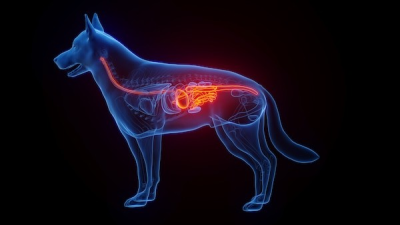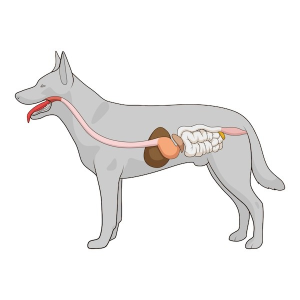Author: Lucie Garabasova
Healthy digestion is key to a dog's overall health and well-being. However, dogs can occasionally experience digestive issues like diarrhea, vomiting, or bloating. Proper nutrition is the foundation for supporting healthy digestion, but there are also certain foods and natural remedies that can help relieve or support your dog's digestive system. In this article, we will explore various options for what to give a dog for digestion and how natural remedies can help address common digestive problems in dogs.
Dog digestion in a nutshell
Find out how your dog's digestive system works.
Here's an overview of how dogs digest:
- Swallowing: Food is first swallowed and travels down the esophagus into the stomach. At this stage, it's important that the dog chews food thoroughly, as this helps initiate the digestive process.
- Stomach: In the stomach, food is mixed with fluids and begins to be broken down. Acids and enzymes in the stomach help to break the food into smaller parts, preparing it for the next stages of digestion.
- Small intestine: Nutrients from the broken-down food are absorbed through the intestinal wall and enter the bloodstream. These nutrients are then distributed throughout the dog's body, providing energy and nutritional support.
- Large intestine: In this stage, additional fluids and nutrients are absorbed, and waste products are processed. The result is the formation of stool, which is then excreted from the dog's body.
How long does dog digestion take?
The time it takes for food to pass through a dog's digestive tract can vary and depends on several factors, including the dog's size, age, metabolism, type of diet, and overall health.
Here are general estimates for digesting different types of food in dogs:
- Canned and wet food: Digesting canned or wet food can take around 4 to 8 hours. This type of food has a higher moisture content and can be processed more quickly compared to dry food.
- Dry food: Digesting dry food can take around 8 to 12 hours. Dry kibble requires more time to break down and digest because of its lower moisture content, so it generally takes dogs longer to process it completely.
- Meaty bones: If a dog eats a meaty bone, digestion may take several days, especially if the dog is actually consuming the bone. Small pieces of bone can sometimes remain in the digestive tract for days before being fully broken down.
What digestive problems can a dog have?
- Diarrhea
- Vomiting
- Bloating
- Gastrointestinal infections
- Allergies or intolerances
- Foreign bodies in the digestive tract
How to recognize intestinal blockage in dogs?
Intestinal blockage in dogs can be a serious health issue requiring immediate medical attention. The primary symptoms of a blockage include vomiting (which may contain food, foam, or even blood), diarrhea or the absence of stool (as a blockage can lead to no bowel movements), abdominal pain, anxiety and restlessness, and bloating.
If you suspect intestinal blockage, seek veterinary help immediately.
What to do if a dog has digestive problems?
- Provide rest and calm: If your dog has digestive issues, it might be best to offer them a quiet and peaceful place to rest. Stress can exacerbate digestive problems, so it's important to minimize disturbances and anxiety.
- Measure meals carefully: If your dog is experiencing diarrhea or vomiting, stop feeding for a few hours to allow their digestive system to settle. Afterward, offer small, frequent meals to avoid putting too much strain on the stomach.
- Offer water: Ensure your dog always has access to fresh water. Hydration is crucial, especially if your dog is vomiting or has diarrhea.
- Monitor symptoms: Keep a close eye on the symptoms and track them so you can provide your vet with accurate information if medical assistance is needed.
- Consult a vet: If digestive problems last longer than 24 hours, involve blood in vomit or stool, or worsen, it’s important to seek veterinary care. The vet can diagnose the issue and recommend appropriate treatment for your dog.
What tea to give a dog for digestion?
Several herbal teas may benefit dogs by supporting digestion and calming the stomach.
- Peppermint tea: Peppermint tea has refreshing properties and can help soothe digestive issues in dogs, including bloating and nausea. Try hemp tea with peppermint.
- Chamomile tea: Chamomile tea has anti-inflammatory and calming properties, which can help soothe an irritated stomach and intestines in dogs. Try hemp tea with chamomile.
- Yarrow tea: Yarrow tea has anti-inflammatory and antibacterial properties, making it useful for treating digestive problems in dogs, such as diarrhea and bloating.
- Mallow tea: Mallow tea has protective and healing properties that can help soothe irritated mucous membranes in the dog's digestive tract.
When giving any herbal tea to your dog, it’s important to ensure it is prepared without sugar or other additives that could be harmful to your dog.
How do hemp bran help with digestion?
Hemp bran is a highly energetic food source and can be fed long-term without limitations. It is produced as a byproduct during seed peeling. The bran contains 42% fiber, creating an ideal environment for the growth and reproduction of microorganisms that ensure digestion and nutrient absorption. They help remove toxins from the large intestine and prevent further buildup, acting as a probiotic. It is recommended as a vegetable side dish, especially for diarrhea, constipation, and loss of appetite.
One kilogram of hemp bran contains 140 grams of high-quality oil with an ideal ratio of Ω-6/Ω-3 fatty acids, ensuring sufficient intake of phytosterols, phospholipids, and natural vitamin E.
We recommend giving one tablespoon daily mixed into food, particularly during digestive issues (highly suitable for diarrhea).
The intestines contain cannabinoid receptors, which are part of the endocannabinoid system, and CBD indirectly affects them.
When you give your pet CBD, the receptors in their intestines are activated, which reduces irritation in their digestive tract.
In dogs, CBD helps reduce inflammation in the stomach or elsewhere in the digestive system that causes nausea or vomiting. It also works against allergic reactions that may trigger digestive issues.
Do not give CBD during acute forms of digestive problems—seek veterinary help instead. However, after acute symptoms subside, we highly recommend administering CBD (with the concentration of CBD drops for dogs depending on the dog’s weight).
What other supplements can be given to dogs for digestion?
The following supplements are generally considered beneficial for a dog’s digestion:
- Probiotics: Probiotics are live microorganisms that support a healthy balance of bacteria in the dog’s digestive tract. They improve digestion and nutrient absorption, especially useful in treating diarrhea or following antibiotic use.
- Prebiotics: Prebiotics are substances that encourage the growth and activity of beneficial bacteria in the dog’s digestive system. They help strengthen the immune system and improve digestion.
- Enzymes: Enzymes help break down food into smaller parts, making digestion and nutrient absorption easier. Enzyme supplements can be especially useful for dogs with insufficient production of digestive enzymes.
The foundation is proper nutrition
Proper nutrition is essential for a dog's health and well-being.
Make sure your dog’s diet is rich in:
- High-quality proteins (chicken, beef, fish, or lamb)
- Healthy fats (coconut oil, flaxseeds, hemp oil)
- Complex and balanced carbohydrates: Opt for healthy sources such as oats, sweet potatoes, or lentils.
- Vitamins and minerals: Ensure the diet contains enough essential vitamins and minerals for the dog's health, such as vitamins A, D, E, B-complex, calcium, phosphorus, iron, and more.
- Regular portions based on the dog’s needs: The quantity and frequency of feeding depend on the dog’s age, size, activity level, and metabolic needs. It’s important to monitor the dog's weight and physical condition, adjusting the food portions as necessary.
- Specific needs: Some dogs may have special needs due to allergies, intolerances, or health issues. In such cases, a specialized diet plan developed by a veterinarian may be necessary.
How to prevent digestive issues in dogs?
Preventing digestive problems in dogs involves several measures to help keep their digestive system healthy and functioning.
- Nutrition: Ensure your dog's diet is balanced, high-quality, and tailored to their age, size, breed, and health status. Avoid overfeeding human foods, treats, or foods high in fat and salt, as they can lead to digestive problems.
- Portion control: Feed your dog regular portions according to their needs and avoid overfeeding. Large portions or overeating can strain the digestive system.
- Access to fresh water: Ensure your dog always has access to clean drinking water. Hydration is key to maintaining a healthy digestive system.
- Regular physical activity: Exercise can help promote healthy digestion in dogs by stimulating bowel movement and metabolism.
- Proper chewing: Make sure your dog has access to safe chew toys or bones that help keep their teeth and gums healthy while supporting natural digestion.
- Parasite prevention: Regularly deworm your dog and protect them from external parasites like fleas and ticks. Parasites can cause digestive issues and pose serious health risks.
- Regular veterinary check-ups: Regular visits to the vet are essential for monitoring your dog's health and preventing potential health problems, including digestive issues






